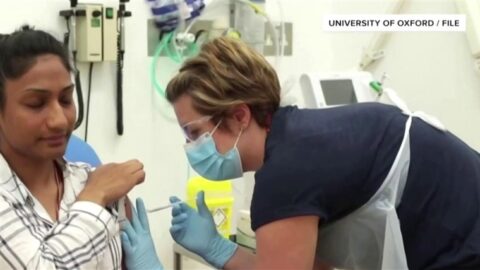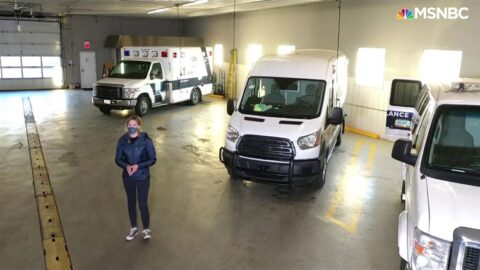Dr. Stefano Nava’s symptoms were mostly mild at first — some intestinal issues and what felt like the flu. But by late March, he had treated enough coronavirus patients to know that things can take a turn. And fast.
“Patients would come in with moderate symptoms, but they became very severe in just a matter of days,” he said, recalling the harrowing months this spring when Italy was the epicenter of the coronavirus pandemic in Europe. His hospital, in the country’s northern Emilia-Romagna region, was overrun with patients with COVID-19.
Nava, chief of respiratory and critical care at Sant’Orsola-Malpighi Hospital in Bologna, tested positive for the coronavirus on March 24. He remembers the psychological horror of that time, made all the more vivid because he had seen firsthand how the disease could ravage people’s lungs, stealing away some patients’ ability to breathe without the help of a mechanical ventilator.
Over 31 subsequent days, as his body battled the infection, Nava reckoned with the unthinkable: “Every night, as I was going to bed, I would phone my attending physician and ask, ‘Is that bed and that ventilator still there if I need it? Is there still a spot for me in my unit?’”
Today, Nava said he is grateful that his situation did not escalate to the point where he needed intensive care. Though he’s still coping with some lingering effects of the disease, he said his bout with the virus has transformed the way he practices medicine.
With Italy facing the possibility of a second wave of infections in the coming months, Nava said he has been steeled by his own experience.
“It changed my state of mind,” Nava said. “As doctors, we know that some people survive and some people die, but this disease gave me a real idea of human limit.”
Italy was one of the first countries hit hard by the pandemic, with skyrocketing cases and deaths from late February through much of March. Hospitals, particularly in northern Italy, were quickly overwhelmed, and the country imposed a strict lockdown on March 9 that lasted roughly 2 1/2 months.
The Emilia-Romagna region, where Nava lives and works, had the country’s second-highest number of confirmed cases and deaths, after Lombardy.
In the earliest days of Italy’s outbreak, Nava said it was a scary time. Doctors and nurses were only just learning how the virus attacks the body, how it spreads and what they could do to treat infected individuals.
To cope with the influx of patients, most of the wards at Sant’Orsola were converted into coronavirus units. Nava and his colleagues also took the time to train hospital personnel in other divisions how to effectively use personal protective equipment, such as masks and face shields, and how to supply oxygen to patients.
Even with help from other divisions, plus doctors and nurses who volunteered from other regions of Italy, Nava said hospital resources were stretched thin.
“Our daily work hours increased to 14, 16, sometimes 18 hours a day,” he said. “I remember going home at 11 p.m. and starting work again at 7 a.m.”
In some cases, health care systems in Italy — particularly in the country’s northern regions — came perilously close to their breaking point.
“We were very close to the failure threshold,” said Roberto Cosentini, head of the emergency medicine unit at the Papa Giovanni XXIII Hospital in Bergamo, in Italy’s Lombardy region. “Our biggest fear was to fail as a system — not just from a professional point of view, but also from a human point of view. For a doctor, to feel useless is the worst thing.”
Front-line workers were also making big sacrifices in their personal lives, with many opting to be separated from their families to protect them from being infected.
“It was very demanding from a psychological point of view,” Nava said.
And then Nava fell ill.
His symptoms were moderate, but after weeks of treating people in intensive care and seeing many patients die alone — with him and his colleagues often being forced to relay the news to loved ones by Skype or FaceTime because relatives were barred from coming to the hospital — Nava knew not to underestimate the virus.
“I would get this sudden sense of death,” he said. “I would be going to bed and think: I’m not sure if tomorrow morning I will be here.”
Four others in Nava’s unit also contracted the virus, and he estimates about 2 percent of hospital personnel at Sant’Orsola got sick from late February through April. In June, Nava co-authored a study in the European Respiratory Journal, titled “An Italian sacrifice to the COVID-19 epidemic,” that detailed how 151 doctors and more than 40 nurses died during that stage of the pandemic and what other health care systems could learn from it.
In the months since he was infected, Nava said he has mostly recovered. He still struggles with some fatigue, and his lungs are noticeably not at their pre-coronavirus capacity.
“During strenuous exercise, I cannot reach what I was doing before,” he said, adding that he used to run three times a week. “I’m up to about 80 percent of what I used to do.”
Occasionally his heart rate spikes for no apparent reason — a lingering symptom that other recovered patients have also described. Sometimes, his elevated heart rate lasts for around 30 minutes, Nava said.
It’s likely too soon to know how the coronavirus may affect people over the long term, but some early studies have suggested that patients could experience respiratory, heart and even neurological problems long after they’ve recovered from the disease.
Yet, through all the suffering, Nava has come to see his illness as a valuable lesson.
“The disease taught us one important thing: Medicine is a probabilistic science,” he said. “In medicine, 1+1 may give you 3 because something unpredictable can really screw things up.”
He also describes surviving Italy’s first wave as a humbling experience.
“It brought us back down to Earth a bit. Doctors now have incredible medicine and robots doing surgical procedures, and then all of a sudden a small virus changed everything,” he said. “It changed my life because I got the sense of being mortal.”








Recent Comments